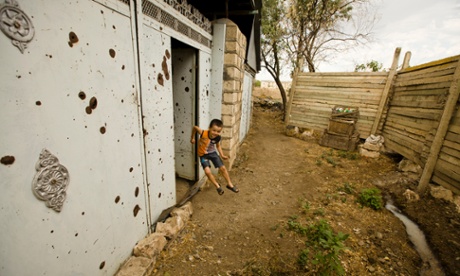Bloody clashes between Azerbaijan and Armenia over disputed territory | World news | theguardian.com
The presidents of Azerbaijan and Armenia are expected to meet for talks this week to try to calm tensions over the disputed territory of Nagorno-Karabakh after some of the bloodiest clashes since the two sides signed a ceasefire in 1994.
Azerbaijan’s defence ministry said 14 of its soldiers had been killed in multiple confrontations, which began on 30 July. According to Azeri news agency APA, Armenian reconnaissance groups tried to cross the contact line along the border, and Azeri armed forces responded.
“As a result of fights, the Armenians gave casualties and retreated,” the semi-official news agency reported.
An anonymous senior Armenian military official also told AFP news agency that Azerbaijan had lost 14 troops in the fighting, but blamed the Azeri side for sparking the incidents.
“Azerbaijani subversive groups were ambushed,” the official said. “As a result, they have 14 dead and lots of wounded.”
He said there had been no casualties or injuries on the Armenian side, although other reports suggested as many as five Armenian soldiers may have been killed.
The defence ministry of the de facto Nagorno-Karabakh republic also said two of its soldiers had been killed as a result of attempted incursions by Azerbaijan. Their names have not been released.
The two sides began fighting over Nagorno-Karabakh in the final years of the Soviet Union, and Armenian forces have wrested de facto control of the territory – though it remains part of Azerbaijan under law. Both sides signed the Russia-brokered ceasefire after six years of fierce fighting, which left an estimated 30,000 people dead and around one million displaced. Despite this, dozens are killed in clashes along the line of control each year.
Oil-rich Azerbaijan has been spending heavily on armaments – it regularly boasts that its defence budget is higher than Armenia’s entire state budget – and has vowed to take back the territory. Violence along the line of contact between the two forces has steadily increased over the last several months.
The EU-funded blog CommonSpace.eu said that while there is “still no clear information about the latest incidents” the fighting represents “the most serious incident on the line of contact since the ceasefire came into affect in 1994”.
James Warlick, the United States representative for the Minsk Group of the Organisation for security and cooperation in Europe (OSCE), which works towards finding a peaceful solution to the conflict, tweeted: “We are seriously concerned about the recent upsurge in violence along the Line Of Contact. The ceasefire needs to be respected.” The United States, Russia, and the European Union all issued statements calling on both sides to respect the ceasefire.
“We see the events of recent days as a serious violation of agreements on a cease-fire and declared intentions to achieve a regulation [of the conflict] through political means,” Russia’s foreign ministry said in a statement at the weekend. “We take the position that any further escalation is unacceptable.”
Armenia’s prime minister, Hovik Abrahamyan, said his country’s president, Serzh Sargsyan, will meet Azerbaijani president, Ilham Aliyev, in the Russian Black Sea resort of Sochi at the end of this week to discuss the violence.
 Ibrahim Aliev, 7, plays near the gates to his family home in the village of Chiragli located near the line of contact. Photograph: Abbas Atilay/AP
Ibrahim Aliev, 7, plays near the gates to his family home in the village of Chiragli located near the line of contact. Photograph: Abbas Atilay/AP“From the start of the year to 1 August, Armenian forces have confirmed 18 fatalities, with Azerbaijan confirming 25, in various combat incidents on the Line of Contact, including sniper shootings, mine explosions and raids,” according to the newspaper Armenian Reporter. “By comparison, in all of 2013 the Armenian side suffered seven fatalities in combat incidents and Azerbaijan reported 12. In 2012 these stood at 14 and 19 respectively.”
However, Armenian analyst Sergey Minasyan said the fighting may not be a sign of escalation but an attempt by Azerbaijan to get the world’s attention. In an interview with RIA Novosti, he said Azerbaijan had shown a pattern of provocative behaviour to try and get the international community to devote more attention to the conflict.
“This event absolutely is not a harbinger of war, more likely it’s a means of political pressure, to threaten war,” he said.
In an interview with government television, Nagorno-Karabakh’s de facto defence minister, Movses Hakobyan, said that the outbreak of violence was due to Azerbaijani defence minister Zakir Hasanov’s desire to “prove himself” after being recently appointed.
“Having failed the negotiation process, the rival is trying to destabilise the situation,” Hakobyan said.